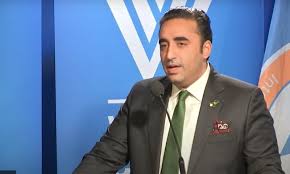Bilawal Bhutto seeks climate justice for people of Pakistan

Berlin: Minister for Foreign Affairs Bilawal Bhutto Zardari Friday said as his country produced less than one percent of the global carbon footprint so he wanted climate justice for the people of Pakistan.
Speaking at a press conference along with German Foreign Minister Annalena Baerbock here after their bilateral meeting, he said, “as the United Nations Secretary General said it is not a question of charity it is a question of justice.”
“We are among the ten most climate stressed countries on the planet. The consequences of climate change are the result of the global action. I hope that the solution of this global problem is also collective and global.”
He said he discussed with the German minister bilateral issues and regional and international developments of mutual interest.
They also exchanged views about the climate catastrophe of epic proportions experienced by Pakistan, he added.

Bilawal said Germany was the driving engine of the Europe’s economy and politics, “so our bilateral relations assume crucial significance”.
“Our relations continue to grow from strength to strength. Last year was special as the two countries celebrated the 70 years of their diplomatic relations.”
He said the global and regional developments even warranted a closer partnership to successfully address the growing challenges.
“We seek enduring solutions for global peace and security. Decades of good will and cooperation must be translated into deeper collaboration.” He said since his last meeting with the German minister the ground realties in Pakistan had fundamentally shifted.
“We had a weather event of biblical proportions. Our monster monsoon started in mid June and continued till the end of August. And when the rains finally stopped a 100 kilometer long lake formed in the middle of my country. Leaving one third of the landmass of Pakistan under water.”
“During the floods, 33 million people were affected of which 16 million were children. 600,000 pregnant women waited to give birth under the open sky. 1700 people had passed away so far and a third of which are children. The climate devastation left more than a million houses destroyed and 4.3 million acres of standing crops were under water,” he explained.
He said after the devastation of floods, Pakistan aspired to build back in a greener and more climate resilient manner.
“And in a manner that has positive implications for our environment and that allows us to adapt, mitigate and transition for the challenging times to come.”
He said he was looking forward to the leadership and support of Germany on the issue of adverse effects of climate change.
The minister pointed out that World Health Organization had warned of a second catastrophe in the form of health disaster with water borne diseases spreading at epidemic proportions.
“We have concerns about food security following the flood damage. The economic consequences of this tragedy are already being felt and will continue to get worse if we are unable to address it.”
He said, “We are incredibly grateful to the German people and the government for the support and assistance given so far.”
He expressed confidence that the mutual desire to deepen relations would prove to be a win win for both the countries.
“We have good discussions on ways to enhance our collaboration in trade, investment, higher education, technology and people to people exchanges.”
“We have a significant Pakistani community in Germany who are positively contributing to the German society.”
He urged the international community to help the people of Afghanistan to avoid humanitarian tragedy and economic collapse.
He highlighted the grave human rights violations in the Indian Illegally Occupied Jammu and Kashmir and said the alarming situation posed risks for regional peace and stability.
“Peace is South Asia will not be possible without resolution of the Jammu and Kashmir dispute in accordance with the United Nations Security Council resolutions, international law and in accordance with wishes of the Kashmiri people.”





